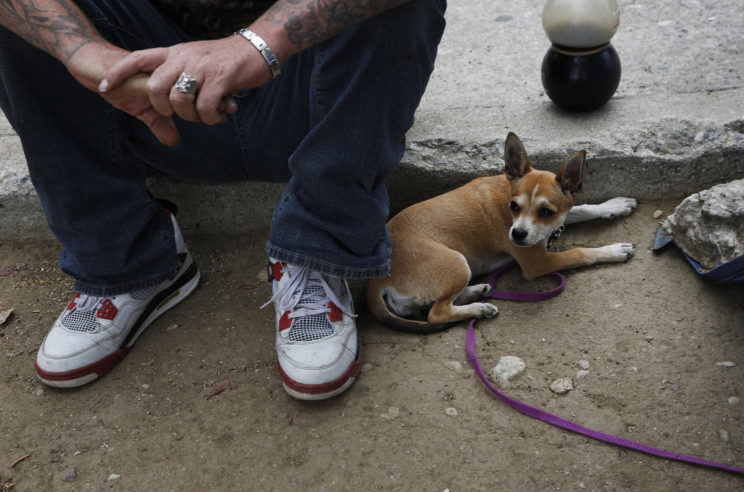
When I was in charge of community programs at the San Francisco SPCA back in the 1990s, we provided free veterinary care for the animals of the City’s human homeless population. Over 20 years later, California will do the same statewide.
The 2019-2020 California budget that went into effect this month includes millions of dollars for such a program. The state will pay veterinarians to go into organizations that provide homeless services to provide free care for the animals of those living on the streets.
It is just one more step California is taking to protect animals. This year, for example, three new laws were enacted:
- Dogs, cats, and other animal companions will be treated like family, rather than property, in divorce cases. California courts will now consider the best interest of those animals in awarding custody. “As more divorcing couples fight over who gets to keep their pets, a new law will allow judges to treat those conflicts more like child custody battles:” Courts “would be allowed to make custody decisions based on who walks a dog, takes a cat to the vet or grooms a horse. Courts will also be authorized to order one spouse to provide food, shelter and medical care for a pet before a final ruling.”
- It is illegal for pet stores to sell dogs, cats, and rabbits from “puppy mills” and other commercial breeding operations. They will only be allowed to partner with shelters, humane societies, and rescue groups to place animals. Not only will the law help increase adoptions, it will decrease abuse. Commercial mills fuel inbreeding, provide minimal to no veterinary care, lack of adequate food and shelter, lack of human socialization, overcrowded cages, and cause neglect, abuse, and the killing of animals when they are no longer profitable.
- Hospitals and healthcare institutions (such as skilled nursing facilities) are required to offer a plant-based (vegan) option at every meal. According to the law’s senate sponsor, everyone “deserve[s] to have healthy and ethical meal choices.” The innocent animals deserve much more.
It also passed two laws that will go into effect at the end of the year:
- It will be illegal to sell cosmetics and hygiene products, such as deodorant and shampoo, that are tested on animals or have ingredients tested on animals. As the largest consumer market in the U.S., companies wanting to sell their products in California — including Proctor & Gamble, Gillette, and others — will have to stop torturing animals. As such, where California goes, so goes the nation.
- It will be illegal to sell eggs in California unless the chickens have at least 1 square foot of floor space. [“The law also requires them to be cage-free entirely (with accommodations including scratching posts, nests, and perches) by the end of the year 2021.”] That doesn’t sound like much, and it is not, but this will give animals a little less misery than they are currently subjected to.* Right now, the average stocking density for egg laying chickens is as low as 67 sq. inches. In some cases, it is lower. The law would increase that to 144 sq. inches (1 sq. foot) at the end of the year and 1.5 sq. ft. per hen after 2021.
There is more to be done, a lot more, including refunding parts of the 1998 California Animal Shelter Law (Hayden) that were suspended by prior governors. But we are making progress.
Onward and upward:
* Unfortunately, the new law does not address the other miseries to which these chickens will be subjected to, including, but not limited to, the grinding up of male chicks alive. The only truly humane eggs are those made from plant-based substitutes. Learn more by clicking here.
————-
Have a comment? Join the discussion by clicking here.